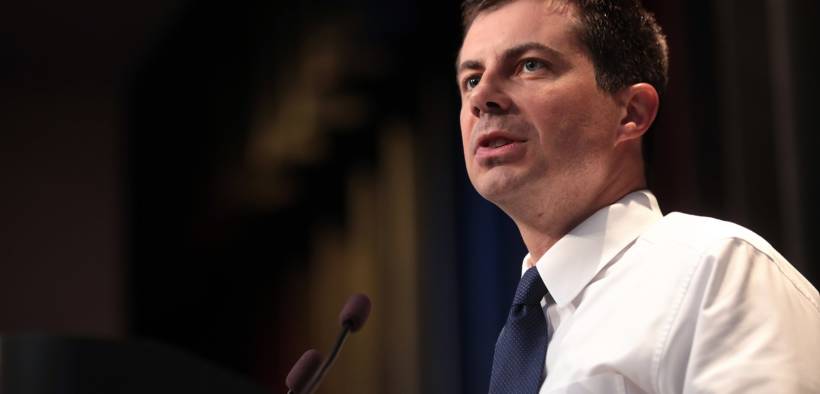Pete Buttigieg – Centrist Democrat or Borderline Progressive?

Pete Buttigieg shot into the Democratic primary like a rising star, but criticism from the progressive left may be bringing him down to Earth.
Pete Buttigieg, the former two-term mayor of South Bend, Indiana and a retired Navy Reserve Intelligence Officer, has quickly risen from an outlying candidate to one of the top contenders for the Democratic presidential nomination. But questions regarding Buttigieg’s platform and policy views abound as progressives have increasingly lambasted him as a traditional centrist-Democrat, lacking a more robust progressive stance on issues.
Buttigieg has been heavily criticized by political activists and other candidates for his cozy ties to big business and his past work as a consultant at a firm that has faced criticism for its ties to authoritarian governments and unscrupulous global corporations. Buttigieg has also been less than forward about the largest donors to his campaign as well as his work at consulting firm McKinsey and Company, which has led to complaints about his campaign’s transparency and earned him derisive nicknames such as “Wall Street Pete.”
So who is Pete Buttigieg?
Buttigieg’s Past at McKinsey and Company
Buttigieg formerly worked for consulting giant McKinsey and Company, which has been denounced in the progressive press for its relationships with Big Pharma and authoritarian regimes in the Middle East and elsewhere. McKinsey and Company is known for hiring Rhodes scholars like Buttigieg to act as consultants for a variety of clients, including authoritarian governments such as China and Saudi Arabia as well as international corporations such as American Express and PepsiCo.
McKinsey and Company’s work overseas has led to allegations of helping authoritarian regimes in Asia and the Middle East commit human rights abuses and crack down on dissidents. McKinsey and Company was also linked to financial misconduct in the United States due to its ties to organizations such as Enron and Valeant.
As Julian Birkinshaw, associate professor of strategic and international management at the London Business School, told The Guardian, “The consultants used Enron as their sandbox” for developing risky and arguably unethical financial practices. McKinsey and Company has also come under fire for work the company did with U.S. Immigration and Customs Enforcement and even Buttigieg himself has referred to the firm as “amoral.”
Buttigieg’s clients at McKinsey and Company included the U.S. Department of Defense and Loblaw’s, a Canadian grocery store chain that was found to have taken part in a price-fixing scheme to raise bread prices during the time that McKinsey consulted for them. Loblaw’s did tell CNN that Buttigieg had no part in the price-fixing scheme and was part of an analytics team.
Buttigieg on Education
The most mysterious aspect of Buttigieg’s campaign might be his educational platform and the financial support he receives from a number of big names in the school choice movement and charter school industry. Education, particularly the rising issues of school choice and charter schools, have become important topics for the 2020 election.
Buttigieg’s financial ties to pro-charter organizations and individuals seem to contradict the positions he has indicated in his platform’s educational plan. His recently released K-12 education plan is over 20 pages long, but charter schools are only briefly mentioned in one paragraph. During stops on the campaign trail, he has also expressed support for banning for-profit charters.
Buttigieg’s actual position on charter schools and how they should be funded and evaluated is vague and fickle, lacking in concrete details. He has claimed that charter schools and traditional public schools should have “equal accountability,” yet he has also expressed the view that each type of institution should have “comparable accountability” depending on the specific situation.
Buttigieg has not taken nearly as strong a stance on educational issues as other candidates such as Elizabeth Warren, who has expressed her desire to end the Federal Charter Schools Program that provides federal funding to finance new charter schools. Nor has he come out as strongly as Bernie Sanders, who has proposed halting the use of federal money to fund new charter schools until a national audit determining their effectiveness and performance has been performed.
One of the members of Buttigieg’s campaign team who has overseen his education platform is Sally Mayes, who is the senior director of Teach for America’s Leadership for Educational Equity.
Other “experts” who have helped to draft Buttigieg’s education policy include John King and Jim Shelton. As commissioner of education for the state of New York, King fought aggressively in support of common core standards to the dismay of concerned and outraged parents.
Shelton worked with the Bill and Melinda Gates Foundation, which is a strong supporter of the charter school movement. The Foundation donated over 25 million dollars to a Washington State charter school group in order to keep charter schools in the state despite strong opposition from local and state governments. They have also invested significant resources into lobbying within this arena.
Buttigieg’s Donors
Buttigieg has faced criticism from other candidates such as Elizabeth Warren regarding issues of campaign transparency and fundraising. In an effort to respond to his criticism, Buttigieg released a list of some of his biggest fundraisers. However, the list omitted many of Buttigieg’s largest donors that were previously listed in an internal campaign fundraising report. The withheld names included controversial donors with ties to Wall Street or other seemingly non-progressive institutions.
One of the biggest donors to Buttigieg’s campaign is John Petry, a wall street hedge fund manager who also happens to be on the board of the New York City charter chain Success Academy. Petry was instrumental in founding the organization Democrats for Education Reform (DFER), which funds campaigns for politicians supporting charter schools and whose membership is mostly comprised of other hedge fund managers.
Though Buttigieg does not appear to have made time to meet with individuals representing teacher’s unions or other more traditional education organizations, he has met with a number of pro-charter school advocates. Many of these pro-charter individuals, including Heather Willey, a well-known education lobbyist from Buttigeig’s home state of Indiana, have also hosted lavish fundraisers for the candidate. Buttigieg has recently faced a barrage of criticism due to the opulent nature of his fundraising events thrown by wealthy supporters, including a recent event at a Napa Valley “wine cave.”
For many years Willey, a lawyer by profession, was a member of the board at the Institute for Quality Education, an Indiana based group that advocates for charter schools and school choice. She is a co-chair of the “Charter School and Innovation” group at her law firm, Barnes & Thornburg LLP. Barnes and Thornburg is listed as a hired lobbyist by a variety of pro-charter organizations and businesses, including Teach for America Indianapolis and Charter Schools USA, Inc., a large for-profit charter chain.
Buttigieg’s shadowy ties to the charter school industry are not confined to his home state. He has a number of wealthy and well-connected supporters in the Silicon Valley and Hollywood, including venture capitalist and Twitter associate Satya Patel, La La Land producer Jordan Horowitz, and Netflix CEO Reed Hastings. Both Hastings, who is one of the nation’s most prominent and well-known charter school supporters, and Patel, who served on the board of KIPP Bay Area Schools, part of KIPP, one of the nation’s largest charter networks, have held extravagant fundraising events for Buttigieg.
One of Buttigieg’s most prominent supporters is Camilo Acosta, another Silicon Valley entrepreneur with strong ties to the charter school industry who has held two fundraising events for Buttigieg. Online bios tout Acosta’s commitment to education reform efforts and hosting fundraisers for organizations such as KIPP and politicians who push for education reform. His Crunchbase profile makes Acosta’s attitude towards traditional public schools and public school teachers very clear when it states that “he [Acosta] was almost assaulted once by an angry mob of fired (read: low-performing) public school teachers while testifying at a D.C. City Council hearing. Camilo enjoyed the experience and The Washington Post found it newsworthy.”
Acosta told Vice News that he and Buttigieg had communicated at length about charter schools and education reform, which was one of the primary reasons Acosta was supporting his campaign.
Buttigieg’s Race Problem
During his tenure as mayor of South Bend, Buttigieg had a somewhat troubling track record regarding relations between the city’s police department and the black community. Buttigieg was responsible for the controversial firing of South Bend’s first black police chief, Darryl Boykins. Boykins later successfully sued the city for racial discrimination.
The Boykins firing was not the only time Buttigieg faced criticism for issues regarding race during his political career. Michael Harriot of The Root has called Buttigieg a “lying motherf-cker” for stating that low educational performance in minority communities is due to the fact that “there are a lot of kids—especially [in] the lower-income, minority neighborhoods, who literally just haven’t seen it work. There isn’t someone who they know personally who testifies to the value of education.” For many, this statement coming from a wealthy, white prep-school educated Harvard grad reeked of paternalism and racial ignorance.
Buttigieg has said that during his tenure as mayor of South Bend he “worked for years under the illusion that our schools in my city were integrated, because they had to be, because of a court order.” He later clarified that this was “true within the limits of the South Bend Community School District,” but not in other parts of the county. South Bend’s public school system was only officially desegregated by a federal court agreement in 1981, and for decades the district struggled to integrate its schools.
Buttigieg has also said that his journey as a gay man mirrors the struggle of black Americans, a remark which drew ire from the black community and former democratic presidential candidate Kamala Harris. Buttigieg has had some difficulty rallying black voters to support his campaign as a result of his comments, and many view his recent promise of a $500 million federal fund to spur economic and racial integration in the nation’s public schools as an effort to court the black vote.
While Pete Buttigieg’s moderate platform, military service and unique background have won him many supporters and admirers, his relationships with the charter school industry, big business and incredibly wealthy donors have made many individuals suspicious of what Buttigieg really stands for.
It may be hard to discern Buttigieg’s true beliefs, but it’s obvious that charter school supporters and other individuals with similar motives have chosen Buttigieg as their candidate. How this will affect his campaign and platform remains to be seen.







